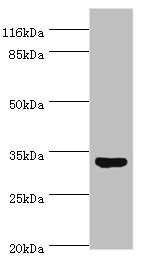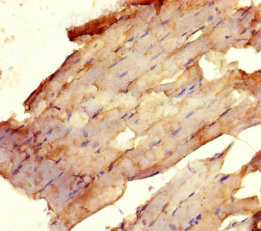Full Product Name
Rabbit anti-Homo sapiens (Human) USF1 Polyclonal antibody
Alternative Names
USF1 antibody; BHLHB11 antibody; USF antibody; Upstream stimulatory factor 1 antibody; Class B basic helix-loop-helix protein 11 antibody; bHLHb11 antibody; Major late transcription factor 1 antibody
Immunogen
Recombinant Human Upstream stimulatory factor 1 protein (3-310AA)
Immunogen Species
Homo sapiens (Human)
Conjugate
Non-conjugated
The USF1 Antibody (Product code: CSB-PA025681HA01HU) is Non-conjugated. For USF1 Antibody with conjugates, please check the following table.
Available Conjugates
| Conjugate |
Product Code |
Product Name |
Application |
| HRP |
CSB-PA025681HB01HU |
USF1 Antibody, HRP conjugated |
ELISA |
| FITC |
CSB-PA025681HC01HU |
USF1 Antibody, FITC conjugated |
|
| Biotin |
CSB-PA025681HD01HU |
USF1 Antibody, Biotin conjugated |
ELISA |
Purification Method
>95%, Protein G purified
Concentration
It differs from different batches. Please contact us to confirm it.
Buffer
Preservative: 0.03% Proclin 300
Constituents: 50% Glycerol, 0.01M PBS, PH 7.4
Tested Applications
ELISA, WB, IHC
Recommended Dilution
| Application |
Recommended Dilution |
| WB |
1:1000-1:5000 |
| IHC |
1:20-1:200 |
Storage
Upon receipt, store at -20°C or -80°C. Avoid repeated freeze.
Lead Time
Basically, we can dispatch the products out in 1-3 working days after receiving your orders. Delivery time maybe differs from different purchasing way or location, please kindly consult your local distributors for specific delivery time.
Usage
For Research Use Only. Not for use in diagnostic or therapeutic procedures.








